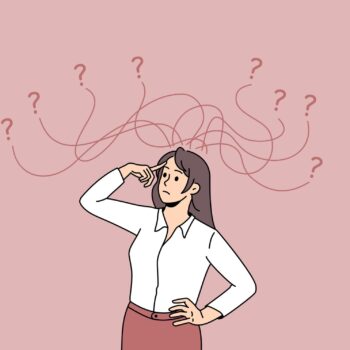Your Grief Feels Enormous When Someone Dies, Here's Why
/ Understanding Grief : Eleanor Haley
It bends my mind to consider how universal and common the experience of losing a loved one is. How could something that feels so catastrophic be such a normal and expected part of being human?
But then I consider that although a living cell is enormously intricate, it is only about 1 micrometer in size. And while there are an estimated 37 trillion living cells in the human body, the Earth is 3.5 million times larger than a single person. And while the Earth is massive, it exists in a solar system about 36 billion times larger. So I guess my point here is that complex, meaningful, and profound things can exist within even larger and more complex systems.
People often underestimate grief. Partly because it's a normal part of being human and partly because it's hard to imagine the breadth of it when you're not living it yourself. But to the person going through it, it's a mysterious experience that involves incredibly nuanced dynamics. Humans are complicated, and relationships create systems as entangled as balls of yarn. And when loss happens, it's as though someone cuts your ball of yarn clear in half, leaving a hundred loose and lonely ends.
Your Grief Feels Enormous Because it is Enormous
Though losses come in all shapes and sizes, some are so significant that they turn your life upside down. To better understand why your grief might feel so overwhelming, let's consider all the types of things a person might grieve after the death of a loved one.
When someone dies, you grieve for them.
It goes without saying that when someone significant in your life dies, you grieve that person. Even if you had a rocky relationship with the deceased, you are likely to have a lot of feelings about the fact that they've died because grieving for a person is far more complicated than simply feeling sad that they're gone.
When someone dies, you will often grieve a timeline that involves the past, present, and future. Memories of happy times may be difficult to access at first because they cause overwhelming sadness, though there's reason to hope they feel more comforting in the future. You also maybe remember and rehash more troubling experiences - things you never got to say, wrongs you think you never righted, and mistakes you believe you made. (Tip: when looking at life in reverse, be mindful of the impact of hindsight bias and counterfactual thinking).
In the present, you grieve their absence. You may struggle to live alongside the vast, dark, and unfamiliar space they have left behind. You worry the only way you'll ever feel better is to have them back, which you intellectually know isn't possible, so at times you may feel hopeless. And finally, you grieve the future they never had. We'll discuss this further in a few sections.
You grieve for yourself.
It's natural for loss to cause a person to contemplate things like their own mortality, their identity and purpose here on Earth. However, many people are hesitant to acknowledge that they are grieving for themselves because they worry it's selfish when it's their loved one who has died. But if you can recognize a person's impact on who you are in life, it follows that their death would have one as well. And understanding who you are in the wake of loss is a necessary part of understanding your grief story.
Most obviously, someone might grieve the loss of roles related to their loved one and past life because relational identities (who you are in relation to others) often change. So, for example, a person might grapple with questions like, "Who am I now that I'm not a caregiver?" or "Am I a spouse or a widow, and how do those things differ?"
But beyond roles and identities, people might question things they thought they knew about themselves. For example, we often hear people express that their confidence and self-esteem felt destroyed by grief. They they no longer move through the world with the ease and certainty they once did, and they feel unsure about their ability to show strength in the face of adversity.
You grieve for your day-to-day life.
Something I personally find incredibly distressing is that, as I grow older, there are more and more places in my past that I can never return to. For example, my grandmother's home or the old Blockbuster on Erie Boulevard that we would hit up every Friday evening in my teen years. Two very different places, but I'm nostalgic for them both.
When someone significant dies, it can feel like the loss has split your life into two parts. There's the life you live now and the life you lived before that you can never return to. You miss your previous life because your loved one was in it, of course, but also perhaps because you think you felt better back then.
Further, loss may have sets off a domino effect of subsequent losses that impacts things like finances, home, roles, responsibilities, friends and family, worldview, etc. These may present new challenges you have to navigate under a fog of grief, and the culminating effect is that life looks forever altered. Ultimately, your life now feels drastically different, and you struggle to acclimate to your new reality.
You grieve for the future.
As previously mentioned, when someone dies, your grief extends into the future. Contrary to what people often expect, thoughts and ideas about the deceased don't stay forever locked in the past. As time passes and you move forward, you will likely think about them, the things they missed out on, and the ongoing impact they might have had on your life.
You may grieve for the future they didn't have--experiences they never had, unaccomplished goals, or hopes and dreams they didn't realize. And you may grieve for the future you wanted to share with them --conversations you imagine you would have had, a reconciliation you might have come to, things you wish you could have experienced together, or the simple fact that expected them to be by your side.
Finally, you may grieve for your future. The absence of your loved one might have practical impacts that mean you cannot pursue the future you imagined you would. Further, a loss can change your sense of priority, value, and direction, so you may feel you aren't even the person you imagined you would be as you move into the future.
When someone dies, you grieve your changing worldview
From childhood, we build an understanding of the world and the people in it. Our worldview includes beliefs and assumptions about faith, spirituality, justice, fairness, morality, right and wrong, good and bad, trust, etc.
We're protective of our worldview because having a sense of how the world works allows us to feel a greater sense of control and security and can help to provide us with purpose and meaning. Though we often have experiences and learn new information throughout life that causes us to revise our assumptions, we resist major shifts and struggle when our belief system is significantly compromised. You can probably see where I'm heading with this.
Though some losses fit within our worldview better than others, many defy our expectations and beliefs about how things should be. We often say that some losses are like violent storms that are so strong they tear your foundational views and assumptions out of your life's bedrock. As a result, much of grief must focus on reorienting yourself to a vastly different world and reconstructing a sense of meaning, purpose, and understanding, having now been through something life-altering.
Sometimes, the way you come to understand the world can feel far worse and more scary, threatening, or random. And sometimes, with the wisdom you've gained and, perhaps, through a continuing bond with your deceased loved one, you're able to reconstruct beliefs that suit you better or feel stronger and richer than before.
If you liked this article, you might like our book. Check out details below!
We wrote a book!
After writing online articles for What’s Your Grief
for over a decade, we finally wrote a tangible,
real-life book!
What’s Your Grief? Lists to Help you Through Any Loss is for people experiencing any type of loss. This book discusses some of the most common grief experiences and breaks down psychological concepts to help you understand your thoughts and emotions. It also shares useful coping tools, and helps the reader reflect on their unique relationship with grief and loss.
You can find What’s Your Grief? Lists to Help you Through Any Loss wherever you buy books:






Rob June 22, 2023 at 11:48 am
To everyone,
I lost my Queen in April of this year. The sadness, and deep gratitude I feel, both for the loss of her, and of my beautiful time with her, is impossible to describe. I’m glad my grief counselor sent me the link to this page. Reading others is a small, but gentle comfort that I appreciate.
ELC April 2, 2023 at 1:28 am
My mother unexpectedly died four months ago. We hadn’t talked in over a year. We had a rocky relationship but I still loved her very much. I feel so much guilt and grief. I thought I had more time to make amends. I cannot stop myself from crying most days. I wish my mother knew how much I love and miss her. Everything I’m feeling is so overwhelming. Some days I think the pain has passed and then out of nowhere I’ll suddenly start crying. Most days it’s hard to sleep, eat and focus on work. I feel like I’m in a fog. My boyfriend thinks I should just “be over it” by now. I just wish I had some someone who understands what I’m feeling.
Clarissa February 12, 2023 at 5:04 pm
I lost my dear husband September 28th 2022. The article was so helpful. It has nearly been 5 months now. I’ve not known how to grieve or who to turn to. Friends have (in my opinion) let me down. I somehow didn’t think to go online to look for support – ridiculous. I had hoped my friends and family would rally and be a source of strength. Not so, and as a result I feel that many of my friendships are now null and void . The disenfranchised grief description just puts it where I’m at. I wasn’t expecting this to be the case and so to have this entity validated in your article has been a turning point. It means I don’t keep hoping that people will be there for me- tough but the reality is easier to deal with than ongoing hurt and disappointment.
I shall read many of your other articles. I was moved by the comments from women who have lost their sons. I don’t (or didn’t) believe you can rank grief but then this makes me question that belief. One thing I selfishly struggle with is people relating their experiences of loss and grief to me, at this time in my life, when their loss was many years ago or was the loss of a very elderly parent. They (understandably) draw parallels and seem to think our grief is in common. For me, I cannot compare my grief from the recent loss of my beloved husband in his sixties a few months ago to their experiences . I cannot imagine how it must be for those who have lost a child. And so I have to question my own assertion that you cannot rank grief. Hence my appreciation of the description of disenfranchised grief.
Sydney March 29, 2023 at 9:19 pm
Amazing that this arrived in my email today. A good friend of many decades died yesterday in hospice. I feel such sadness. She chose to fight death with horrendous treatments because she wanted to see her 8 year old grandson grow up. That will not happen. As a person of strong faith I accept God’s will which is too often impossible to understand. When my husband died after a long and difficult illness and I could not talk about it with many people she was the person who approached me , with great kindness and sensitivity, noticing that I did not seem to be ok. I shared with her and she kept it in confidence as I requested until the time came when I was ready to speak of it. Will always remember and cherish that from her.
Steve December 24, 2022 at 2:03 am
Iv read thru the offered text about my personal grieving. And to put it nicely, describing all of the types of grieving does .nothing for the reader accept play to their experience like that some how will help. It doesn’t help. You should try teacihng methods that help as a source of useful information. Instead of preying on people’s suffering to sell a book with no proof you can help readers. You stole 15 minutes of my time ill never get back.
Litsa December 28, 2022 at 11:41 am
Hi Steve, Sorry you didn’t find this helpful. We have 650 articles about grief on this site, many of which are about methods for coping with grief. Describing the grief experience is useful for many people (though of course not all, grief is different for everyone) and research time and again has demonstrated that, showing that one of the most beneficial things for those grieving is normalization and validation that what they are feeling is normal before then building on skills to cope. We released this book 3 months ago after writing free grief articles on this site for over decade with hundred of free articles, free podcasts, and free courses for people grieving. We only wrote it because many readers who had been helped by our site and publishers had asked us to. As you likely know, authors make next to nothing on books so we certainly don’t have any drive to make anyone buy the book who doesn’t want to and that is in no way the intention of our site or article – they long preceded the book. We’ve experienced devastating personal losses that brought us to this work and that is what lead us to spend our mental health careers working with thousands of people grieving who have been helped by our work. But that isn’t a promise or proof that it is right for you. Grief needs are unique and different for everyone. Our style and approach is perfect for many people and not right for others. If you let me know more specifically what you are looking for help/methods with, I can try to point you in the direction of some of our free articles and free podcasts that tackle specific approaches and methods for coping that might feel more relevant (for example, anger, guilt, loneliness, meaning and purpose, attention and distraction, etc). You can also always use the search bar and the categories and tags to explore the library of many other articles.
Steve December 28, 2022 at 1:20 pm
Thanks for the reply. Im all in now.
Neressa M December 14, 2022 at 9:48 pm
i lost my son in 2018 and everyday seems to be the day he died i never got counseling or anything i just live with my loss everyday , my husband left me because i could not suck it up and move on with my wifely duties if u know what i mean iam still stuck at the day he died help!
Mary Manera June 24, 2023 at 11:42 pm
I am so sorry for what you are going through. Unfortunately, there is no “answer” to grief, but there is support that is available and can help you move forward. We are a grief website, so we provide access to free articles, a podcast, and online courses that may be helpful for you. But the best way to get individual support is to see a grief counselor. There is a grief therapist directory here so you can find someone who is located in your area. I hope this is a place to start. https://complicatedgrief.columbia.edu/for-the-public/find-a-therapist/
anonymous December 12, 2022 at 5:40 pm
Unsupportive siblings and their spouses, in-laws too. A card. An email. No visits when in the area. Kept a wide distance.
I let myself see it, know it. I spoke up. Said “Here’s what would help me. Here’s what I need. Here’s what’s not helping me, so please stop it. Here’s what I feel sad about.”
I was unheard. Told me instead about their problems–by email. Told me get over it, they are tired of death–by email. Told me to get a dog–by email.
Now they want to re-write history and tell me I confused them.
They’ll understand (maybe) someday.
Meanwhile, I’ve been steadying myself and remaining authentically me. Not stubborn or willful. Just not going to wear the mask they require, or become ill from stuffing what’s real. I don’t have to pretend that this is a lighthearted choice– to finally give myself full permission to stop hoping for change, to stop waiting for kindness. I am not willing to trade my health for their comfort.
Or lose my moments of quiet loving joy remembering and celebrating the life I shared with my beloved for 33 years.
Told one sib today it’s unlikely I’ll ever see him or the others again. It felt Right, Honest and True. Spirits Up! Building a life now on steady ground.
Kitty E December 8, 2022 at 11:57 pm
I want to read because I lost my husband three years ago and I still cry everyday. I know I need help and maybe something I read will help me. Many days I just do not want to go on.
Mary Manera June 24, 2023 at 11:43 pm
The best way to get individual support is to see a grief counselor. There is a grief therapist directory here so you can find someone who is located in your area. I hope this is a place to start. https://complicatedgrief.columbia.edu/for-the-public/find-a-therapist/
JP December 8, 2022 at 7:55 pm
Thank you so much for this website and articles as well as the open comments. Because of COVID this was my only source of counseling for my grief at the time. I was able to find and meet with a counselor later. However, I find this website helps a ton, thank you.
JP
Anna Thebodeau November 27, 2022 at 7:25 pm
I can totally relate Allison my son overdosed this year in March what you said sums it up exactly devastated the feeling doesn’t go away, heartbroken 💔 like you died when he did. Right?
D November 9, 2022 at 5:55 am
So appreciate this article and website. It is so good to remember how our experiences are common. We can take comfort in that and having a place to go in grief, What’s your grief, is helpful. We need to share these experiences and comfort each other. We are here to bring glory to God and one way we do that is to comfort others in the same way we have been comforted. Thank you for giving us a place to do this.
Linda November 8, 2022 at 2:06 pm
I lost my mom and best friend in December
of21. My emotions are so raw yet. Then people are telling me to get over it.
How do you get over the loss of a mom?
D November 15, 2022 at 11:54 am
Hi Linda, you don’t get over the loss. You grieve, you absorb and you keep going forward. This loss will make you different. God is present in your grief and loss.
Nina G November 18, 2022 at 10:35 pm
I am so sorry for your loss. You never get over losing your mom. Anyone who tells you to get over it is clueless.
Namita November 27, 2022 at 9:47 pm
I lost my mother in February of 2022. She was 86. I am aware that she lived a long life, that her passing kept the order of loss of generations in the correct order…. I was also her caregiver for a while too…nevertheless, I can’t seem to gain the perspective others feel should help me… e.g. her long life, “worse” losses of others, that everyone goes through this, world suffering etc.
Nina G. November 8, 2022 at 11:49 am
Three sentences in your essay put words to feelings I share with you most days, especially in relation to my mother’s death. Unwelcome, they darken my day-to-day life.
“Something I personally find incredibly distressing is that, as I grow older, there are more and more places in my past that I can never return to. For example, my grandmother’s home or the old Blockbuster on Erie Boulevard that we would hit up every Friday evening in my teen years. Two very different places, but I’m nostalgic for them both.”
These feelings of nostalgia often lead me to despair. Sometimes so powerful as to be agonizing. I cannot express this to anyone. As grief is rarely a front burner topic of conversation, less so are words describing this.
Thank you for your articulate expression of this pain.
Roseann November 4, 2022 at 10:14 pm
Living with “Grief” is very tiring and draining, leaving the body in a state of numbness. There seemed to be No, Life, No positive feelings, No Hope, Joy or Peace. Everything had changed. Confusion and Uncertainty dominated my mind. With Tears unmanageable. I Lost my Son! How could I go on and live a life without him in our Family.? But Hope did arrive, in a Support group with other parents. A Beautiful Leader who guided all of us and gave her heart and soul to us. We all benefitted from her guidance. This group saved my Life! My Husband ,Myself and my other Son,began to Cope and Heal.🙏🏻🙏🏻🙏🏻😥😥❤❤
Sue November 8, 2022 at 1:39 pm
Thank you. I lost my son too to suicide. I wanted to die, for a long time i was numb but a bereavement counsellor and friends have befriended me and given me a bit of life back. Little by little the resr of life is growing again around this catastrophic hole. Thanks for writing.
alison November 10, 2022 at 9:18 am
My son died in 28th August aged 25 I’m totally devastated and heartbroken